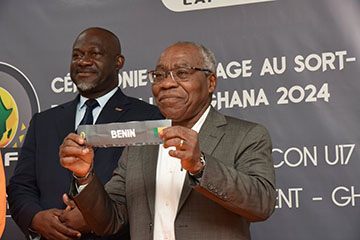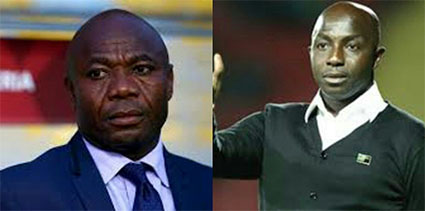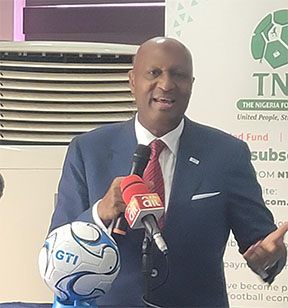Nigerian Football
A Man Nigeria Should Not Have Forgotten
BY KUNLE SOLAJA.
This Thursday marks the 38th anniversary of Nigeria’s first victory in the Africa Cup of Nations. Perhaps it was divinely designed as an eternal tribute to this great, yet largely unknown man, that Nigeria won its first Africa Cup of Nations on this particular date, March 22 in 1980.
His name rings no bell. He is largely forgotten and never mentioned in the discourse of organised football in Nigeria. Perhaps such history makers were born to pass unnoticed.
Going through the official history of the of the world’s oldest football association, The Football Association Limited, England, there was a similar scenario.
The FA admitted that one Ebenezer Cobb Morley’s initiative gave birth to it. In the official history of the world’s oldest football association, it was written that despite Morley’s initiative, he is only given passing reference in football literature.
Such is also the fate of Joseph Mead in Nigeria. Most people, even the older football followers may not have come across the name of this man. It is because of him, that there is a football governing body that was called the Nigeria Football Association (NFA) which is today’s Nigeria Football Federation, NFF. He called for the meeting that led to the formation of the NFA.
Perhaps without his initiatives, we will not be talking of the Nigeria Football Federation or its lead brand, Super Eagles which will clock 70 next year August. The first national team of Nigeria, the famed “UK Tourists” sailed out of Apapa Port on August 16, 1949. That was when the story of what is popularly called the Super Eagles began.
As a prelude to the ongoing discourse, most people may not know the fallacy of the NFF claim that it was founded in 1945. Yet the federation has neither proof to back the claim nor evidence of the actual date it believed it was founded.

- Skipper Christian Chukwu lifting the Africa Cup of Nations on March 22, 1980. It turned to be a lasting birthday tribute to the NFA’s first Secretary who could have turned 73 on that day.
Existing evidences contradict the “Founded 1945” that the NFF logo carries. Documented evidences exist at the National Archives of Nigeria in Ibadan and The FA in England where the then NFA was first affiliated, that the football governing body was founded on August 21, 1933.
Establishing the Nigerian football governing body was not an easy task. The bulk of the credit went to Joseph Mead, the unsung father of the now NFF. He was the organising secretary of the group that founded the then NFA.
Daily Times account revealed he worked with the firm, UAC at Martins Street, Lagos. He called up the inaugural meeting and later emerged as the first secretary of the Nigerian football governing body.
According to the Daily Times account on the foundation of the NFA in 1933, Mead was elected as secretary. The man at the helms was Henry A. Porter, an architect with the Public Works Department.
Porter went by the title, President. There were three vice presidents – Frederick Baron Mulford, Dr. Isaac Ladipo Oluwole and Sir. Adeyemo Alakija.
Mead’s identity was a mystery until the Unilever Archives in London, responding to enquiries by Sports Village Square, provided photograph of him and his full name.
The meaning of the initial “J” which appeared in all Nigerian newspapers references to him was later given as Joseph.
According to the Daily Times accounts, he worked with the firm – UAC at Martins Street, Lagos. Checks at Unilever in UK revealed that he joined the company in February 1929.

- Joseph Mead, sitting with the ball, was a member of the UAC team in the European League in Lagos. He was the first Secretary of NFA.This 1936 picture is published courtesy Unilever UK.
Great thanks to Helen Onsworth, the archivist at Unilever UK Central Resources Limited who assisted in unveiling the convener of the meeting that led to the foundation of a central football body in Nigeria.
From the information on Mead, he became the first secretary of the NFA at age 26. On leaving Nigeria after working with UAC in Lagos and Ibadan, he was transferred to the then Gold Coast (now Ghana) where he worked in Kumasi and Takoradi.
According to information from Unilever in UK, Mead married on January 23, 1939 before resigning from the firm in 1949.
Checks at the National Archives of the United Kingdom revealed that Mead must have arrived Nigeria in 1929 having left Liverpool for Lagos on February 26.
His occupation in the manifest of the ship was given as “assistant”. He was part of the European football league in Lagos, playing for UAC team.
Shortly before the August 21, 1933 meeting which Mead called, he was involved in an accident. Unilever Archives disclosed that their records showed his date of birth as March 22, 1907.
He would therefore have been 73 years; the day Nigeria beat Algeria to win the Africa Nations Cup for the first time in 1980. It could not be verified if he were alive at the time.
According to information from Unilever UK, Joseph Mead left for Nigeria Sekondi-Takoradi in Gold Coast (now Ghana) as District Manager of UAC in March 1946.
Today he would have been 110. Tracing the man Joseph Mead was not an easy task. But great thanks to Unilever UK which maintains an archive of virtually everyone that passed through its system.
It is Mead that one is celebrating today. It should be remembered that he was not the only pioneer. There was Henry A. Porter, the pioneer president and a senior architect with the then PWD (possibly the present day Federal Ministry of Works and Housing).
A fellow of Royal Institute of British Architects, Porter designed the Centenary Hall, Ake, Abeokuta. He was also the founder of the Lagos Amateur Football Association in 1930.
There was also Dr Isaac Ladipo Oluwole (died May 4, 1953), Sir Adeyemo Alakija (died May 10, 1952), and Frederick Baron Mulford (an expatriate popularly called ‘Baba Eko’).
Mulford was buried in Lagos at the Ikoyi Cemetery on September 4, 1949, the day after his death at Creek Hospital. According to a tribute by Ernest Ikoli published in the Daily Times edition of September 5, 1949, Mulford was never married.
They have all passed on, but there contributions towards the formation of a central football organisation should be well acknowledged.
The FA in England in 2012 decided to trace and honour the living descendants of the eight founding fathers that created the body 150 years earlier.
A total of 16 relatives of the Founding Fathers of football were invited to a special ceremony at Wembley Stadium, where a Blue Plaque was unveiled that pays tribute to the historical significance of their work in creating the game of football. What a lasting tribute those pioneers got.
Here in Nigeria, the labour of our heroes past must not be in vain. I salute the winning Nigerian team of 1980. Tributes are also given to Joseph Mead.
Nigerian Football
Nigeria face tough defence as Burkina Faso lie in wait at U17 WAFU B AFCON qualifiers

Defending champions Nigeria have been handed a difficult path to the 2025 U17 Africa Cup of Nations finals after being drawn in the same group as Burkina Faso for next month’s WAFU B qualifying tournament in Ghana.
The Golden Eaglets, who won the last edition of the regional championship in 2022, will also face Togo and Niger in Group B of the competition which runs from 15-28 May.
Hosts Ghana find themselves in Group A alongside Cote d’Ivoire and Benin in a tough-looking section of the competition to be played in Accra.
The draw was conducted by 1970s Ivorian football legends Kobenan Kouman and Die Foneye at the Ivorian FA headquarters in Abidjan on Friday.
Nigeria claimed their WAFU B U17 AFCON title by defeating Burkina Faso 2-1 in the regional final in Ghana two years ago.
However, they will need to overcome some familiar foes if they are to defend their crown and with the Burkina Faso finishing third at the last TotalEnergies U17 Africa Cup of Nations, some exciting matches are expected.
Arch-rivals Nigeria and Ghana are among the two favourites and could meet in the final in Accra on 28 May, should they top their respective groups and make it through the semi-finals.
Ghana also have pedigree at this level, having the World Cup in 1991 and 1995 as they bid to reach the U17 AFCON finals on home soil.
The top two teams from the WAFU B tournament will qualify for next year’s U17 Africa Cup of Nations.
Groups:
Group A: Ghana, Cote d’Ivoire, Benin
Group B: Burkina Faso, Nigeria, Togo, Niger.
Nigerian Football
Former Nigeria international, Onye recommends Amuneke-Siasia combo for Super Eagles

BY KUNLE SOLAJA.
Kingsley Onye, the left sided defender who was a member of the first Flying Eagles side to have a podium finish at the U-20 World Cup has suggested the employment of Emmanuel Amuneke as the coach of the Super Eagles.
He wants him to be assisted by Samson Siasia when the ban on the latter lapses in August. Alternatively, Onye pointed to Sylvanus Okpala as alternative to Siasia.
The Super Eagles are in dare need for a head coach as the clock ticks down to the Match day 4 and 5 of the 2026 World Cup qualifiers in which the team is trailing at the third position.
The two matches in early June are crucial for the Super Eagles to bounce back into reckoning as the team can not afford to drop any of the available six points in the duels with South Africa at home and away to Benin.
From this Monday, it is 41 days to the potentially challenging tie with South Africa, but the Nigerian national team has been without a coach since the expiration of the contract of Portugal’s Jose Peseiro shortly after the Africa Cup of Nations in Cote d’Ivoire.
Without mincing words, Onye remarked: “Emmanuel Amuneke is the right man for the job of the coach of Super Eagles. He has been there before.
“He tasted it and had been fantastic with the Nigeria youth team, the U-17 by assisting Manu Garba to win the U17 World Cup in 2013 and as head coach, led the Golden Eaglets to win the cup again in 2015.”
Onye who played for the Enugu Rangers in Nigeria before venturing to the UK but had his career scuppered by freak injury pointed out that the solution to Super Eagles’ technical deficiency is the appointment of an indigenous coach and that Amuneke is the man.
In buttressing his assertion, he declared: “As a senior team coach, Amuneke qualified a long standing absentee team, Tanzania for the 2019 Africa Cup of Nations.
“His record as a player is also very impressive. He played and won with the Super Eagles, the AFCON 1994. He played at the Olympic Games and was also the first Nigerian to score two goals at the World Cup.
“He has played at the African Games and also for top clubs in the continent as he was a member of the Egyptian giants, Zamalek. In Europe, he played for Sporting Clube de Portugal and then Barcelona before injury ended his playing career.”
Onye also looked at the personality of Amuneke in recommending him for the Super Eagles job.
His record as a player is also very impressive. He played and won with the Super Eagles, the AFCON 1994. He played at the Olympic Games and was also the first Nigerian to score two goals at the World Cup.
He has played at the African Games and also for top clubs in the continent as he was a member of the Egyptian giants, Zamalek. In Europe, he played for Sporting Clube de Portugal and then Barcelona before injury ended his playing career.
Nigerian Football
GTI enlarges coast…spreads from League fund-raising to Federation Cup

BY KUNLE SOLAJA.
Strategic partners of the Nigeria Football Federation, GTI Asset Management and Trust Ltd has expanded their scope of operations from fund sourcing for the Nigeria Premier League to adding the responsibility of getting the national cup competition back into its glamorous days.
The MD of the company, Abubakar Lawal at the unveiling a revamped Federation Cup which has been renamed President Federation Cup remarked that his company decided to take a bold step to support the national cup.
“I am the happiest man today, he said in the opening remark of the rebranding of the national cup through signing of Memorandum of Understanding with the Ministry of Sports and the NFF.
“Our company is also strategically involved in ensuring that the President Federation Cup is given necessary attention to thrive using The Nigeria Football Fund (TNFF) as our vehicle to actualise this dream.
“Therefore, it is our vision that the oldest domestic football event becomes one of the best organised football events in the world in no distant future.”
-

 Nigerian Football1 week ago
Nigerian Football1 week agoRemo Stars add fuel to the fire as title chase turns East – West battle
-

 Olympics1 week ago
Olympics1 week agoSuper Falcons’ Paris 2024 fixtures recall Nigeria’s first matches at Olympic Games football event 56 years ago
-

 UEFA Champions League1 week ago
UEFA Champions League1 week agoNigerians among Leverkusen’s African quintetin historic Bundesliga triumph
-

 Nigerian Football1 week ago
Nigerian Football1 week agoRangers tenaciously hold on at Nigeria League top position
-

 Nigerian Football1 week ago
Nigerian Football1 week agoHeartland back to their homeland as they host Shooting Stars
-

 OBITUARY1 week ago
OBITUARY1 week agoAnother Germany World Cup winner dies
-

 FEDERATION CUP6 days ago
FEDERATION CUP6 days agoBREAKING! Federation Cup acquires presidential nomenclature…7th name since inception
-

 CAF Confederation Cup5 days ago
CAF Confederation Cup5 days agoConfederation Cup runs into crisis as Moroccan players of RS Berkane are stranded at Algerian airport following seizure of jerseys and equipment




